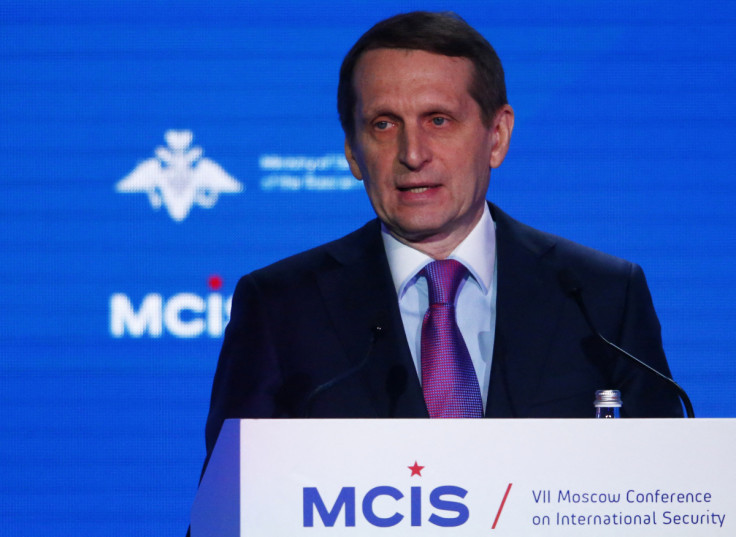Russian Spy Chief And CIA Head's Phone Call On Ukraine: Everything To Know

KEY POINTS
- Sergey Naryshkin said the call took place soon after failed Wagner mutiny
- Naryshkin and William Burns discussed "what to do with Ukraine"
- Sergey Naryshkin expressed openness to the possibility of future conversations with Burns
Sergey Naryshkin, Russia's foreign intelligence chief, stated that he had a phone conversation with his CIA counterpart, William Burns, during which they discussed "what to do with Ukraine," the state-run TASS news agency reported.
Both The New York Times and The Wall Street Journal reported on June 30 that William Burns had made a call to Sergey Naryshkin, with the purpose of assuring the Kremlin that the US was not involved in the recent brief mutiny led by Yevgeny Prigozhin, a Russian mercenary boss, and his Wagner group of fighters.
Sergey Naryshkin confirmed that during their conversation, Burns raised the matter of the events that occurred on June 24. These events involved the mercenaries seizing control of a city in southern Russia and subsequently advancing toward Moscow, only to eventually reach an agreement with the Kremlin to bring an end to the rebellion.
During their approximately one-hour-long conversation, Naryshkin stated that the majority of the call was dedicated to considering and discussing potential actions or approaches concerning the situation in Ukraine.
In response to a question from a TASS correspondent, Sergey Naryshkin expressed openness to the possibility of future conversations with William Burns through phone calls or even in-person meetings. However, Naryshkin noted that there has been no explicit mention of such engagements at present.
Despite the strained relations between Moscow and Washington, Burns and Naryshkin have managed to maintain a line of communication since the beginning of the Ukraine war. This communication channel has been significant, especially considering that direct contacts between the two capitals are currently limited, and overall relations between the two countries are at their lowest point since the Cuban Missile Crisis in 1962.
Last month, Naryshkin made a statement asserting that the Western nations had brought about their own downfall by deviating from what he referred to as their fundamental values and traditions. He strongly advised the West to cease meddling in global affairs and bluntly suggested that they "go to the devil."
During a security forum held outside Moscow and attended by foreign security officials, Naryshkin made notable remarks that expressed strong anti-Western sentiments. These remarks highlighted the significant level of animosity Moscow holds toward the West, particularly due to its perceived support for Ukraine. Naryshkin's comments underscored the depth of hostility in Russia's stance towards the West, Reuters reported.
"The Anglo-Saxons might be advised to attend to their own internal civil conflicts. Better still, to clear off to their acquaintance, the devil," Naryshkin said. Like other Russian officials, Naryshkin refers to Britain, the US and other English-speaking countries in the West as "the Anglo-Saxons."
"It is pertinent to remember the biblical truth: the end of them will be according to their deeds. And that means that their end will be a sad one," he said.
Meanwhile, Ukraine, in response to the ongoing conflict and Russia's seizure of a significant portion of its territory, has made it clear that it will not engage in talks at the moment. The reason behind this stance is the concern that entering into negotiations could potentially solidify the current situation on the battlefield, effectively freezing the territorial gains made by Russia.
© Copyright IBTimes 2024. All rights reserved.











